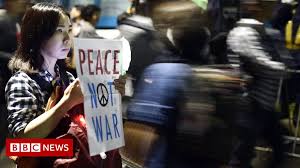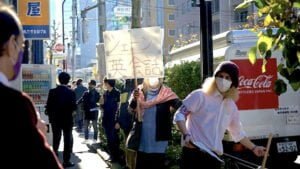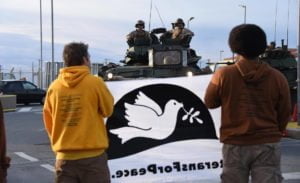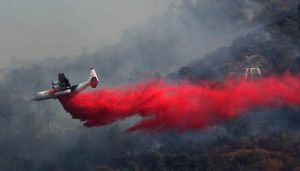左派は現在、技術を階級闘争の主要な戦線ではなく二次的な関心事として扱っているため、戦いの一部で敗れています。しかし、この戦いはまだ終わっていません。勝利はスローガンからではなく、技術の意識的かつ効果的な活用に基づくビジョンを実践的なプログラムに変え、資本主義のデジタル支配に対抗する実行可能な代替案を提供することから生まれます。左派は防御的な立場にとどまってはならない。技術闘争に積極的に参加し、技術の受動的な利用者ではなく、未来を再形成する力となる明確な戦略を掲げなければなりません。
-‘Love of country’ curriculum hit
Japan Times
Tuesday, May 13, 2003
https://www.japantimes.co.jp/cgi-bin/getarticle.pl5?nn20030513b5.htm
By GARY SCHAEFER
The Associated Press
Few schools in Japan are complying with government guidelines suggesting that students be graded on how patriotic they are — and those that have face opposition from teachers, parents and citizens’ groups.
“Fostering love of country” was added as a curriculum goal for sixth-grade social studies classes under guidelines first approved by the education ministry for the school year that ended last month.
Patriotism here is often associated with the jingoism trumpeted by Japan’s militarist government and forced upon students in the decades leading up to this country’s defeat in World War II.
The nonmandatory guidelines suggested that teaching patriotism would encourage children to take pride in their history and culture.
But according to a recent survey by a Japanese newspaper, less than 200 of Japan’s 24,000 public elementary schools are complying. Parents and citizens’ groups are protesting, and a spokesman for the nation’s largest teachers union said in an interview that he questioned the constitutionality of the guidelines.
“The freedom of belief is guaranteed by the Constitution and applies to children as well,” said Shinji Furukawa, a spokesman for the Japan Teachers’ Union. “We think it is very serious that this language has been included in the guidelines before the matter was debated by the Diet.”
Japan’s Asian neighbors, which bore the brunt of its past military adventures, have frequently criticized Tokyo for allowing wartime atrocities to be whitewashed in officially sanctioned textbooks.
Officials have defended the patriotism guidelines.
“The advisory council’s view was that it was important in international society for students to develop a sense of identity as Japanese,” education ministry official Yuiichi Sakashita said. “The idea is to teach kids to understand and appreciate their country and its history and traditions.”
The old curriculum for sixth graders called on teachers to foster a “love of Japan’s history and traditions.” The new version adds “love of country” to that list, Sakashita said.
A board of education official in the city of Fukuoka, where 51 elementary schools started giving grades for “love of country” in the last school year, said the decision had “nothing to do with nationalism.”
“We’re not grading students on how much they love their country,” Mamoru Shibata said. “It’s basically about how much interest they’re showing in their studies about Japanese history and culture.”
Such explanations have done little to placate critics.
“I think students are already taught enough about taking pride in their history and culture,” said Noriyoshi Mukoyama, principal of Tokyo’s Seisho Elementary School, one of the many schools that hasn’t added “love of country” to its report cards.
“I didn’t see any need to give a grade for that,” he said.
Schools implementing the grades have significant leeway in deciding what constitutes patriotism, since the ministry guidelines provide few specifics.
The very idea of having such classes is upsetting some parents.
“Who’s to say what patriotism is? How do you grade it?” asked Hiroaki Nakane, 49, whose daughter is a fifth-grader in Fukuoka. “The whole thing sounds like a return to the militaristic thinking in this country before the war.”
The matter is particularly complex for minorities, particularly the large Korean community. Korea was under Japanese colonial rule from 1910 to 1945, and many ethnic Koreans in Japan descended from workers brought here forcibly as laborers.
“How is a Japanese teacher supposed to grade a Korean on love for country?” said Lee Han Eun, 32, who runs a Korean citizens’ group. “We’re worried that this is part of a broader trend toward nationalism — not just a question of report cards.”
Also from Friday, October 18, 2002
https://www.japantimes.co.jp/cgi-bin/getarticle.pl5?nn20021018a8.htm
A government advisory panel on education has compiled draft amendments to the Fundamental Law of Education that call for nurturing children’s patriotism, morals and respect for Japanese culture, according to sources familiar with the panel’s discussions.
The Central Council for Education plans to hold subcommittee discussions on the draft on Oct. 24 before determining a rough plan on Oct. 30 for its interim report on the proposed amendments, the sources said on Wednesday.
The draft is to review the current 1947 “education constitution,” which emphasizes individual self-esteem and independence of children.
The draft says Japan’s education should aim to foster “tough” Japanese. It also calls for a new basic education law that would address the importance of education at home, lifetime education, and social volunteer work, according to the sources.
The draft does not say anything about changing the law’s preamble, which sets out the Constitution’s antiwar stance, or anything about reviewing Japan’s ban on religious education in public schools. The panel has not reached a consensus, the sources said.
The ministry earlier said it hopes to submit a bill to the Diet in 2003 that would amend the law after receiving suggestions from the council.
On Nov. 26, 2001, Atsuko Toyama, minister of education, culture, sports, science and technology, asked the panel to recommend within a year whether it thought the law should be revised.
She told the council at that time to consider recommendations made in December 2000 by the National Commission on Educational Reform, a private advisory panel to then Prime Minister Yoshiro Mori.
Mori’s panel proposed revisions focusing on points such as scientific and technological advancement, international coexistence, environmental problems, family education, respect for traditional culture, religious education and the need for a basic education promotion plan.
And from Thursday, October 10, 2002
https://www.japantimes.co.jp/cgi-bin/getarticle.pl5?nn20021010a4.htm
Korean group protests grades for patriotism
FUKUOKA (Kyodo) A Korean citizens’ group here is protesting a report card used at local municipal elementary schools that includes an evaluation of students’ Japanese patriotism, group members said Wednesday.
Lee Bak Sung, a lawyer and director of Woori Sahwe, which means “our society” in Korean, said such an evaluation could lead to discrimination against students with foreign citizenship.
The group’s leader, Chong Gi Man, submitted a written demand Wednesday to Fukuoka City Hall that the item be eliminated from report cards.
The group has also called on the Fukuoka Prefecture bar association for help and has demanded that the municipal board of education eliminate the evaluation, according to Lee.
“Children using their ethnic (Korean) names will be subject to discrimination and prejudice. It sends a message to Korean residents of Japan and other foreigners that they should engage in studies as a Japanese,” Lee said.
There are some 500,000 Koreans with permanent residency status in Japan, including many who were forced to come to Japan to work as laborers during Japan’s 1910-1945 colonial rule of the Korean Peninsula, as well as their descendants.
The Fukuoka City Board of Education said the section was among four items deemed worthy of evaluation in the field of social sciences when a committee of principals compiled a draft report card for use in fiscal 2002, which began in April.
Among the 147 municipal elementary schools in Fukuoka, 69 use the report card for sixth-grade students, board officials said.
The item allows teachers to evaluate whether children “cherish Japan’s history and traditions and have feelings of love toward the country, as well as try to identify themselves as Japanese in this world which aims for peace.”
Mamoru Shibata, an official of the Fukuoka board of education, said the issue should be considered flexibly in the future.
Meanwhile, an official of the Education, Culture, Sports, Science and Technology Ministry suggested that the policy for handling foreign students is left to each school.
“The nation’s education will focus on educating its citizens, but we must also naturally respect the identities of Korean residents of Japan and other (foreigners),” the official said. “Each school needs to decide how to care for foreign children.”






















Leave a Reply
You must be logged in to post a comment.